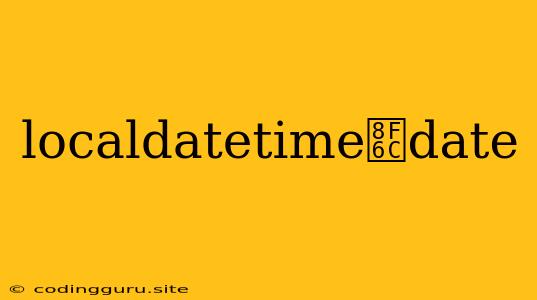How to Convert LocalDateTime to Date in Java?
In Java, dealing with dates and times can be tricky. The LocalDateTime class represents a date and time without any time zone information. While it's useful for representing a specific point in time, sometimes you need to extract only the date portion from it. This is where converting LocalDateTime to Date comes in handy.
What is LocalDateTime?
LocalDateTime is a class in Java's java.time package, introduced in Java 8. It represents a date and time with nanosecond precision, without considering any time zone.
Why Convert LocalDateTime to Date?
There are several reasons why you might want to convert LocalDateTime to Date:
- Legacy systems: Many older APIs still work with the
java.util.Dateclass. - Database interactions: Some databases might store dates in a
Dateformat. - Simplified data representation: If you only need the date information, converting to
Datecan make your code more readable and efficient.
How to Convert LocalDateTime to Date
Here's the most common way to convert LocalDateTime to Date:
import java.time.LocalDate;
import java.time.LocalDateTime;
import java.util.Date;
public class LocalDateTimeToDateConversion {
public static void main(String[] args) {
LocalDateTime localDateTime = LocalDateTime.now();
// Convert LocalDateTime to LocalDate
LocalDate localDate = localDateTime.toLocalDate();
// Convert LocalDate to Date
Date date = Date.from(localDate.atStartOfDay(ZoneId.systemDefault()).toInstant());
System.out.println("LocalDateTime: " + localDateTime);
System.out.println("Date: " + date);
}
}
Explanation:
- Get LocalDateTime: We first get the current
LocalDateTimeusingLocalDateTime.now(). - Extract LocalDate: We extract the date portion from the
LocalDateTimeusing thetoLocalDate()method. This gives us aLocalDateobject representing only the date part. - Convert LocalDate to Date: We convert the
LocalDatetoDateusing the following steps:- Create an Instant: We use
atStartOfDay(ZoneId.systemDefault())to create anInstantrepresenting the start of the day in the system's default time zone. - Convert Instant to Date: We use the
toInstant()method to convert theInstantto anInstantobject. Finally, we useDate.from()to convert theInstantto aDateobject.
- Create an Instant: We use
Important Considerations:
- Time Zone: The
LocalDateTimeclass doesn't have any time zone information. When converting toDate, it's crucial to consider the time zone you want to use. In the example above, we use the system's default time zone. - Loss of Precision: Converting
LocalDateTimetoDateinvolves discarding the time portion. This means any nanosecond precision in theLocalDateTimeis lost. - Alternative Approaches: There are other ways to convert
LocalDateTimetoDate, but the method mentioned above is generally the most straightforward.
Example:
LocalDateTime localDateTime = LocalDateTime.of(2023, 10, 27, 10, 30, 0);
LocalDate localDate = localDateTime.toLocalDate();
Date date = Date.from(localDate.atStartOfDay(ZoneId.systemDefault()).toInstant());
System.out.println("LocalDateTime: " + localDateTime); // Output: 2023-10-27T10:30
System.out.println("Date: " + date); // Output: Fri Oct 27 00:00:00 UTC 2023
Conclusion:
Converting LocalDateTime to Date is a common requirement when working with Java's date and time classes. By understanding the process and the considerations involved, you can efficiently convert between these two data types while preserving the relevant information. Remember to consider the time zone and any potential loss of precision when making the conversion.
